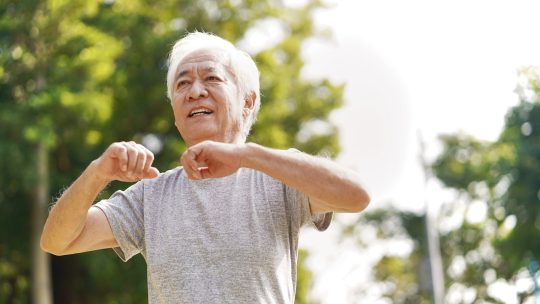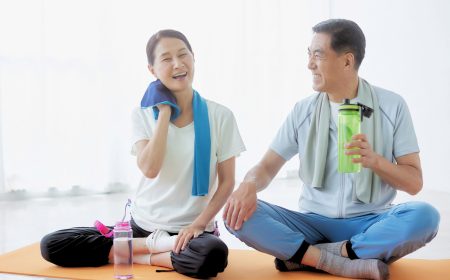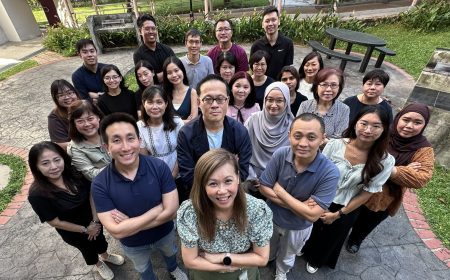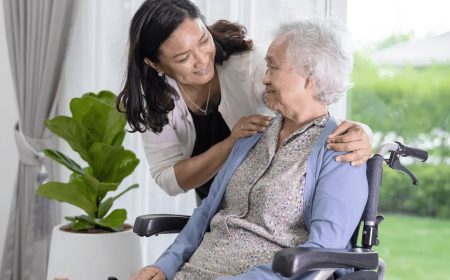Singapore is entering a transformative chapter in its national healthcare journey. With an ageing population, the government has responded with initiatives such as Healthier SG, and Age Well SG, that focuses on preventive health by promoting healthier lifestyles1, and supporting seniors to age well in their homes and their communities2. At its core lies a powerful principle: active ageing. But what does this really mean, and why is it essential for our seniors?
This article explores why active ageing is more than just a public health goal—it’s a personal mission for every member of the community. From combating dementia in Singapore to addressing issues such as loneliness, we will examine how staying active helps seniors to age well, live well, and build a society where every citizen thrives, regardless of age.
Ageing in Singapore: The Urgent Need for Preventive Health
Ageing Singapore is a reality that policymakers and healthcare providers can no longer afford to overlook. By 2030, nearly one in four citizens will be aged 65 and above3. While longevity is worth celebrating, living longer is only beneficial if we also live well.
Unfortunately, chronic illnesses like diabetes in Singapore, cardiovascular disease, and osteoporosis are increasingly common among the elderly. Many of these conditions can be prevented or managed through lifestyle adjustments. That’s where Healthier SG benefits come into play—providing seniors with personalised healthcare plans, subsidised screenings, and structured support to take control of their health4.
What Is Active Ageing, and Why Does It Matter?

Active ageing in Singapore is not simply about keeping busy. It refers to enabling older adults to age well by maintaining physical activity, engaging with the community, and continuing to learn and grow. The concept is rooted in independence, dignity, and meaningful participation in society.
Whether it’s taking regular walks, attending group exercise classes, or signing up for nutrition workshops, active ageing allows individuals to remain independent.
Physical Activity: The Foundation of Healthy Ageing
Regular physical activity is the bedrock of good health at any age. Exercise helps to maintain muscle strength, joint flexibility, and cardiovascular fitness, which collectively reduce the risk of falls and injury.
Simple routines such as a walk in the park can have profound effects on the physical and mental well-being of seniors. Such low-impact activities not only improve mobility but also encourage outdoor exposure, social interaction, and a sense of routine. According to health experts, just 30 minutes of walking a day can significantly reduce the risks of heart disease and stroke5.
Additionally, maintaining physical health supports the body in managing chronic illnesses such as diabetes, high blood pressure, and arthritis. By integrating movement into daily life, seniors improve their chances of ageing well, with fewer complications and hospitalisations.
Combatting Dementia and Cognitive Decline
Cognitive health is a major concern for ageing populations. Rates of dementia in Singapore are rising steadily6, with conditions like Alzheimer’s placing emotional and financial stress on families and the healthcare system alike. However, staying active—both physically and mentally—can play a key role in delaying or reducing the risk of dementia.
Engaging in activities like puzzles, reading, attending community talks, or learning digital skills stimulates the brain. Combined with regular exercise, these activities promote neuroplasticity and cognitive resilience. Research has shown that seniors who remain mentally stimulated are less likely to experience memory loss and are better able to maintain independence in daily living7.
The cognitive benefits of exercise are equally compelling. Movement increases blood flow to the brain and boosts the release of mood-enhancing chemicals, which support both memory and overall mental healthiness. By creating daily habits that prioritise activity and stimulation, seniors can better preserve their cognitive abilities and reduce the emotional toll of age-related decline.
Mental Health and Social Connection: A Growing Concern
One of the often-overlooked aspects of ageing is the mental and emotional dimension. Seniors and loneliness is a rising concern in Singapore, where more elderly are living alone. The feeling of isolation can lead to depression, anxiety, and even physical health problems. Loneliness not only affects mental health and wellbeing but is also linked to increased mortality.
That’s why active ageing isn’t limited to physical exercise—it includes social engagement as well. Activities such as group fitness sessions, art classes, or simply joining neighbours for regular walks can reduce feelings of loneliness and create stronger community bonds.
Healthy Eating and Daily Habits Matter
Physical activity must go hand in hand with consuming food containing proper nutritions. A healthy diet helps prevent chronic diseases, supports energy levels, and improves mood. For seniors, dietary needs evolve with age, and careful attention must be paid to daily sodium intake, sugar consumption, and hydration.
Excessive daily sodium intake, common when one tends to consume many processed or restaurant foods, can lead to high blood pressure—a risk factor for strokes and heart attacks. Seniors are advised to use herbs and natural ingredients instead of salt to add flavour, and to be mindful of food labels.
Balanced meals that include lean protein, whole grains, healthy fats, and ample fruits and vegetables help maintain bone health and reduce the risk of diabetes, especially among those already diagnosed with or at risk for metabolic conditions.
Independence and Mobility
One of the most empowering aspects of active ageing is the ability to maintain independence. The more physically and mentally capable a senior remains, the more likely they are to manage their own household, handle their finances, and engage with the world around them.
Loss of independence is often what leads to institutionalisation or heavy reliance on caregivers. Staying active prolongs the period during which older adults can live independently, make their own choices, and enjoy freedom.
Mobility is crucial here. Incorporating activities such as daily walks, stretching, or light strength training keeps the body agile and strong, preventing the gradual decline that often leads to disability.
Practical Tips for Seniors to Stay Active
For those wondering where to begin, active ageing can start with small, manageable changes. Incorporating simple exercises into your routine, joining a local tai chi or yoga class, or signing up for a community gardening programme are excellent ways to stay physically and socially engaged.
Trying out new hobbies such as painting, learning a musical instrument, or attending educational talks can stimulate the mind and bring joy. Reducing daily sodium intake, drinking more water, and preparing meals at home are practical dietary steps that can quickly add up to better health.
How Families and Communities Can Support Active Ageing
Promoting active ageing is a shared responsibility. Families can support their elderly loved ones by encouraging regular activity, planning outings, and engaging them in daily decisions. Simple gestures like inviting a senior on a walk, helping them join a community club, or teaching them how to use a smartphone can make a meaningful difference.
Government initiatives like Healthier SG reflect the growing emphasis on preventive care, offering benefits such as personalised health plans, subsidised screenings, and access to wellness activities. These programmes aim to make it easier for individuals to take control of their own well-being and age well.
Healthier SG Benefits: Making Prevention Easy and Affordable
Healthier SG gives residents, including the elderly—access to tailored preventive care. Upon enrolling with a family doctor, seniors receive a comprehensive health assessment, annual check-ups, and customised health plans8.
Preventive services, including vaccinations and health screenings, are subsidised under Healthier SG, reducing financial barriers and encouraging earlier interventions. By focusing on prevention, the system supports seniors in living not just longer, but better.
Supporting Your Journey with NTUC Health Active Ageing Centres
For seniors seeking to stay active, connected, and well-supported, NTUC Health Active Ageing Centres offer a welcoming environment. With 25 centres islandwide, and plans to expand to 27 by 2026, our centres provide a variety of activities—from exercise sessions to arts and crafts activities—designed to help seniors age well and live well every day.
With the support of friendly staff and volunteers, our Active Ageing Centres offers vibrant spaces where seniors can build friendships, discover new interests, and take positive steps toward better health and mental well-being. We also offer male-exclusive programmes and intergenerational activities to foster meaningful engagement and connections.
Whether you’re looking for a group walk in the park, or simply a place to engage with others, NTUC Health Active Ageing Centres are here to support your journey towards active and fulfilling ageing. With a variety of activities happening across our centres, we encourage seniors to explore our different Active Ageing Centres to try something new. Check out our programme calendars to find out more!
1https://www.healthiersg.gov.sg/about/what-is-healthier-sg/
2https://www.agewellsg.gov.sg/about/
3https://www.moh.gov.sg/others/resources-and-statistics/action-plan-for-successful-ageing
4https://www.healthiersg.gov.sg/enrolment/benefits/
5https://www.betterhealth.vic.gov.au/health/healthyliving/walking-for-good-health
6https://www.mindsciencecentre.sg/msc_research/rising-number-dementia-cases-singapore-asia/


